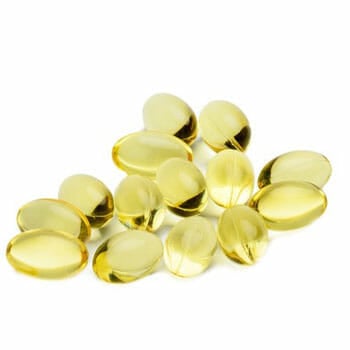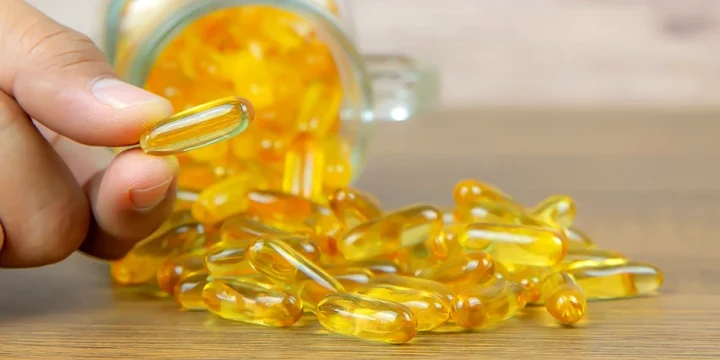Everyone goes through an acne stage during their teenage years, which sometimes remains even in adulthood.
We can all agree that no one wants to walk around looking like a pizza. That’s why, as a health optimization coach, I gathered a team and spent hours examining what the top wellness professionals have to say about fish oil and its effects on acne.
If you’re struggling with skin disorders and keeping them under control, you’ll want to learn more about how fish oil can help.
Quick Summary
- Fish oil contains omega-3 fatty acids, namely DHA and EPA, which improve the general look of the skin and help eliminate acne.
- Natural fish oil, processed fish oil, and krill oil are the best when treating acne.
- A study at Seoul National University found that after 10 weeks of omega-3 fatty acid supplementation, inflammatory and non-inflammatory acne decreased significantly.
- I believe incorporating fish oil into your diet is a simple yet effective way to combat acne and enhance overall skin health.
What Are the Effects of Fish Oil on Acne?

Fish oil contains essential omega 3 polyunsaturated fatty acids, which play a vital role in promoting general skin health and getting rid of blemishes.
These omega 3 fatty acids help soothe skin, making it less prone to pimples and lesions.
Research suggests that omega 3 fatty acids are effective in combating moderate to severe acne.
One particular study conducted at Seoul National University was used:
“To evaluate the clinical efficacy, safety, and histological changes induced by dietary omega-3 fatty acid and γ-linoleic acid in a control group of acne patients… after 10 weeks of omega-3 fatty acid or γ-linoleic acid supplementation, inflammatory and acne [caused by non-inflammatory conditions] decreased significantly. [1]”
- Jae Yoon Jung, Clinical Trial Researcher
These medically reviewed trials provide strong evidence that including essential fatty acids in your diet or using omega 3 supplements can reduce the severity of breakouts.
How Does a Fish Oil Supplement Help With Acne?

Reducing Inflammation

Inflammation is a common cause of adult acne.
Omega 3 supplements help reduce acne severity and prevent future breakouts, as they contain properties to combat inflammation.
EPA and DHA naturally combat inflammation by blocking arachidonic acid - a compound responsible for inflammation.
These fatty acids provide a soothing effect by lowering the body's inflammatory response at a cellular level.
Restoring Hormonal Balance
Hormonal acne is common during events that stimulate hormonal fluctuations. It includes the pre-pubescent and teenage periods in both sexes and pregnancy and perimenopause in women.
Hormonal acne is caused by an influx of androgenic hormones in the body. These hormones trigger oil glands to produce more sebum, leading to clogged pores and breakouts.
Taking fish oil enables the body to produce eicosanoids, which regulate inflammation and helps restore hormonal balance. It further limits the overproduction of skin oil and prevents outbreaks.
Anti-oxidation Effects

Oxidative stress is another cause of inflammation in your skin.
It occurs when there is an imbalance between the production vs. accumulation of oxygen in the cells.
When sebum becomes oxidized through stress, this creates a favorable environment for acne to thrive in.
Unfortunately, it also induces lipid peroxidation in the skin cells, resulting in breakouts and other skin conditions.
Omega-3 fatty acids in fish oil have strong anti-oxidation properties that combat the effects of stress, helping treat and improve acne.
Lowering IGF Levels
Our liver naturally produces a hormone known as insulin-like growth factor (IGF-1).
In excessive amounts, this hormone increases skin inflammation and sebum production, making your skin more fragile to acne and other bacterial infections.
Fish oil helps regulate these hormones and prevent IGF-1 from causing breakouts.
What Type Is Best For Treating Acne?

- Natural fish oil, extracted from tissues of oily fish and comes in the form of triglycerides. It has a high concentration of EPA and DHA, making it very effective for treating breakouts.
- Processed fish oil, purified with altered concentration levels to meet consumer demands. It is the most common form and usually comes in the form of capsules.
- Krill oil, a special kind of fish oil harvested from krill. Krill oil has very few contaminants and comes with a natural antioxidant, making it potent for treating breakouts. Cod liver oil, harvested from the liver of Atlantic codfish. Cod liver oil contains essential omega 3s, which are vital in fighting breakouts, and is also rich in vitamins A and D - both of which are effective antioxidants.
What Kind of Acne Can Fish Oil Supplements Help With?
Does Fish Oil Cause Acne?

Related Posts:
Fish Oil and Its Impact on Skin Microbiome
Fish oil is crucial in balancing the skin microbiome, which is essential for skin health and acne prevention. We’ve determined that omega-3 fatty acids in fish oil help maintain a healthy balance of bacteria on the skin, which can prevent acne outbreaks.
Regularly incorporating it into your diet is an effective strategy for long-term acne prevention. Omega-3s, especially EPA and DHA, keep the skin clear and healthy and regulate sebum production.
FAQs
How Do You Use Fish Oil for Acne?
By taking 2-4 capsules of fish oil every day, the boost in vitamins and omega 3 can help with skin hydration and treat acne.
How Can I Clear Inflammatory Acne Naturally?
Reducing inflammation is the best way to naturally clear acne affected by inflammation.
Some methods for doing so include applying ice to the affected area, keeping your skin moisturized, using vinegar to fight bacteria and infections, and taking vitamins that regulate hormone production like zinc.
What Are the Best Vitamins for Acne?
The best vitamins for acne are vitamin A, vitamin D, vitamin E, and zinc.
These vitamins help regulate hormones and contain properties that combat inflammation, which can effectively treat breakouts.
References:
- https://www.medicaljournals.se/acta/content/abstract/10.2340/00015555-1802
- https://www.sciencedirect.com/science/article/abs/pii/S0190962212001648
- https://jamanetwork.com/journals/jamadermatology/fullarticle/479093
About The Author
You May Also Like






